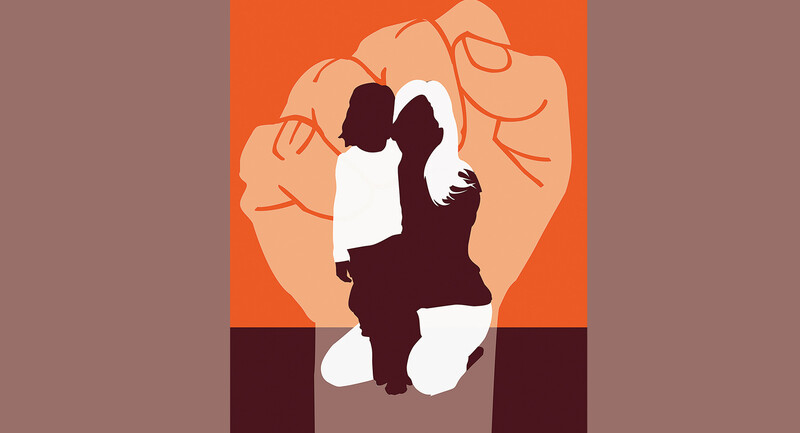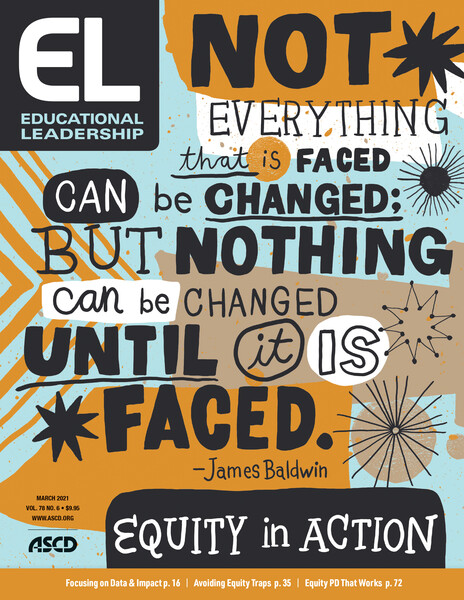As a college student in Vermont more than 15 years ago, I took a child development course as one of the requirements of the teacher education program. In that class, my peers and I learned about the stages of childhood development as well as the social, emotional, and academic supports necessary for students to thrive.
I remember what happened one day, in particular. My best friend, Alicia Hernández, a Honduran woman, and I rushed into class just in time after running from another campus building a mile away. We took front-row seats next to each other so that we would not disrupt our classmates with our almost-late arrival. As was customary, our instructor, a white woman, took attendance before her lecture.
Since Alicia's last name begins with an H, the instructor called her name before mine.
"Alicia Hernández," the instructor read, anglicizing the pronunciation of my friend's name.
Busy rustling through her bookbag for a notebook and pen, Alicia did not hear her name, leaving our instructor to scan the room looking for an Alicia Hernández. When the instructor's gaze landed in our direction, she looked at both of us, and without skipping a beat, said, "One of you two."
With a roomful of white classmates, she assumed that one of us had to be the obvious owner of the Central American surname.
Our instructor called the next name after Alicia's and proceeded as if she had not just insulted us, as if she had not just reduced us to a blob of one-of-you-two.
I could not concentrate for the rest of the period. My heart raced. My body grew tense. My mind filled with questions: How come she didn't make an effort to learn our names after four weeks of taking attendance? Why did she think it was acceptable to diminish our individuality? When will these public assaults, these public erasures, stop?
With her actions, our instructor communicated to us and our classmates that, like her, they did not need to learn our names. They did not need to get to know us. They did not need to regard us as more than one of the two girls of color in a sea of whiteness.
Opposing SEL Mindsets
While my instructor taught us the importance of social-emotional learning (SEL) in child development, she was not culturally competent. She illustrated how an educator could be well-versed in textbook SEL practices and still inflict harm on students. Simply put, to be effective equity-centered educators, we cannot be emotionally intelligent without being culturally responsive (Simmons, 2019a).
That college experience, along with many others from my schooling and work life, exemplifies why SEL faces the risk of becoming white supremacy with a hug if we do not apply an anti-oppressive, antiracist lens (Madda, 2019; Simmons, 2019b).
Through my work with school districts nationally, I have learned that some educators share distinct reasons for implementing SEL depending on who their students are. In mostly Black, indigenous, and people of color (BIPOC) school districts, SEL is often about compliance and control. SEL then becomes another way to penalize and police BIPOC youth for their non-whiteness and to justify their supposed inferiority for lacking "these necessary skills" (Kaler-Jones, 2020; Simmons, 2019c). What is even more perverse is the implicit belief that SEL skills are exactly what BIPOC students need to function in underresourced classrooms and to smile through the pain of racism. On the other hand, for white, privileged students, SEL is about supporting college and career readiness. These opposing mindsets lead to different practices and outcomes, which ultimately perpetuate a racial hierarchy that positions white students on top.
As we confront our country's sin of racism, we must acknowledge that our nation's schooling has always been an education in whiteness (Brooks & Theoharis, 2018), which manifests as textbooks lauding white heroes, excuses about too few "qualified" BIPOC teacher candidates, dress codes that criminalize Black hair, productivity over people, and well-meaning educators who correct Black diction but claim color-blindness. In this context, any curriculum, policy, or practice in our nation's schools that is not deliberately and actively combating racism, bias, and oppression can easily be used as a weapon to put BIPOC students in their place.
Relatedly, the overwhelming number of articles that cite SEL as critical to employability (Committee for Children, 2016) also puts white hegemony on display. It seems we cannot talk about SEL without talking about what we deem, in a narrow sense, as employable and professional. For me, that has always meant talking white, dressing white, and acting white—unspoken rules I have learned on my educational and professional journeys. If we laud SEL for how it supports youth with career, business, and economic success, we must also reckon with our blind obsession with capitalism and its relationship with the white supremacy upon which it was built. We can still prepare students for future success without diminishing their identities, without sending them the message that there is only one way to be successful. We have to begin to open our minds to the possibility of genius outside of whiteness.
SEL that fails to address our sociopolitical reality and combat racial and social injustice will not prepare our young people for the world they will inherit—one fraught with hate, misunderstanding, and bigotry. SEL alone will not keep politicians from making laws that disenfranchise BIPOC communities. SEL alone will not keep educators from suspending BIPOC children at disproportionate rates. SEL alone will not keep teachers from having low expectations for BIPOC students. SEL alone will not prevent cops from killing BIPOC people. If SEL alone were the magic bullet, perhaps George Floyd, Breonna Taylor, and Walter Wallace Jr. would still be alive today. We need more for our collective healing.
Is SEL, alone, enough to provide this? Absolutely not.
In Need of Collective Healing
Over the past year, there has been much talk about the importance of SEL in schools as a necessary response to our pandemic reality. There has been an influx of stand-alone courses about managing stress and anxiety, pushes for educators to focus on self-care, and free student resources offering mindfulness strategies for the uncertainty. As a long-time proponent of SEL, I could not be happier.
However, as we embrace this new urgency, we must address not only the trauma of COVID-19 but also that of racism. Pushing for "neutral" SEL only aims to protect white comfort. That is, courses that teach educators how to manage stress and anxiety without speaking to the stress and anxiety stemming from racism disregard the experiences of BIPOC people and contribute to the trauma of erasure. Likewise, pushing for teacher self-care without also advocating for school systems to value teacher health and well-being puts the onus on educators, making collective care nearly impossible. And asking students to practice deep-breathing in response to systemic oppression is simply offensive.
Collective healing starts with committing to eradicating our country's wound of racism and not looking away, sanitizing history, or advocating for neutrality. It means taking a stand against the injustices we witness in our districts, schools, and classrooms, whether that happens through community organizing, peaceful protest, or speaking up in-the-moment. It means creating space for processing the collective traumas of the pandemic, racism, and other forms of oppression in our school communities. It means abolishing white supremacy culture from our schools to prevent the constant spirit-murdering of BIPOC students, educators, and families. It means implementing culturally and contextually responsive practices. It means prioritizing care through partnering with community therapeutic providers and building healing-centered practices into the fabric of schooling. It means ensuring equity, justice, and humanity in our teaching and learning. And it means loving and honoring BIPOC members in our school communities, not just saying we do.
An Antiracist Approach to SEL
Last June, while in quarantine, I became the victim of a hate crime. Shattered, I had no choice but to focus on my healing. I reflected on what was important to me, what inspired me, and what made my spirit feel most whole. In the process, I rediscovered my voice, the one that had been tone-policed, silenced, and punished for the past six years because it was, as I was told, "too strong" and "too powerful."
As part of my healing journey, I left my job, in the middle of a pandemic. I needed my voice to ring louder than other people's doubts, slights, and limitations. I left so that I could save myself, so that I could dream. And I left so that I could invest my time into changing the very system that failed me and is failing so many others.
For me, that has led to the development of LiberatED, a new program that takes an anti-racist approach to SEL and healing. Instead of assuming what people need, the LiberatED team and I are connecting with school communities through a listening tour to collect stories, needs, and ideas about healing, SEL, racial justice, and abolitionism. From what we learn from educators, families, and students during the listening tour, we will create resources, curricula, and training. In this way, LiberatED will become a community-generated, student-centered approach to SEL, racial justice, and healing. In our preliminary conversations with school leaders, we have learned that educators have great interest in implementing SEL and diversity, equity, and belonging (DEB) practices in their districts. However, many do not know where to begin or how, especially as it relates to racial justice. Above all, schools want to do well by their students, but I remain steadfast in my belief that good intentions are not enough. While the interest in SEL and DEB work is heartening, interest does not always result in action. We need to start our racial justice journeys now. To this end, I invite educators to start a practice of reflecting on their identity, positionality, power, and privilege. Had my college instructor understood the damaging effects of her white-centered perspective, perhaps she would have called Alicia's name again and waited for a response. Perhaps she would have admitted to the class that she was still learning names. Perhaps she would not have left Alicia and me scarred with her nonchalant erasure. Bound to white supremacy's need for urgency and productivity (Western States Center, 2003), my instructor breezed through attendance in her desire to be efficient. However, there is a tension between equity and efficiency. Equity takes more time. Efficiency saves time, but at what cost?
Additionally, schools could collect data and devise action plans from their own listening tours about what belonging means for their school communities, especially since many of us are physically apart this school year. In the process of transforming how we teach for our new virtual and hybrid settings to build connectedness and engage students, we could check in with our students through surveys and one-on-one conversations to ensure we are meeting their needs.
Though we are already exhausted and overwhelmed with so many pressures related to the pandemic, we still must find the time to take inventory of our curricula, pedagogy, and policies to ensure they prioritize student safety and belonging. That is, affirming our BIPOC educators, students, and families must be a part of every pandemic-safety plan. This moment calls for developing partnerships with community organizations to support children and adults with healing, SEL, mental health resources, food security, and basic needs.
Freedom-Dreaming for an Antiracist Future
So much time has passed since that college experience. Yet I still shudder at the memory of my instructor's reduction of my individuality. Too many others have a collection of similar reductions, similar scars, from well-meaning educators, whose unchecked privilege and a lack of cultural competence harmed them. The field of SEL cannot similarly fall victim to this pattern. We cannot rely solely on good intentions, on how we teach empathy, without being self and socially aware enough to interrogate how such a kind field could perpetuate white supremacy culture.
Ultimately, my hope is that, through projects like LiberatED and through schools committing to racial justice and collective healing, we can begin to dismantle structural, institutional, and individual practices that harm young people, that inhibit their optimal social, emotional, and academic development. Educators and students deserve to express themselves freely without fear, to be treated with respect and valued, to feel safe, and to go to schools that challenge bias, discrimination, and oppression.
As I've written before, the pandemic is our equity check, our opportunity to do and be better. LiberatED is one part of my effort to be and do better, part of my freedom-dream for a future where we are liberated from the burden of hate and oppression, where we are all free to live and learn in the comfort of our own skin.







